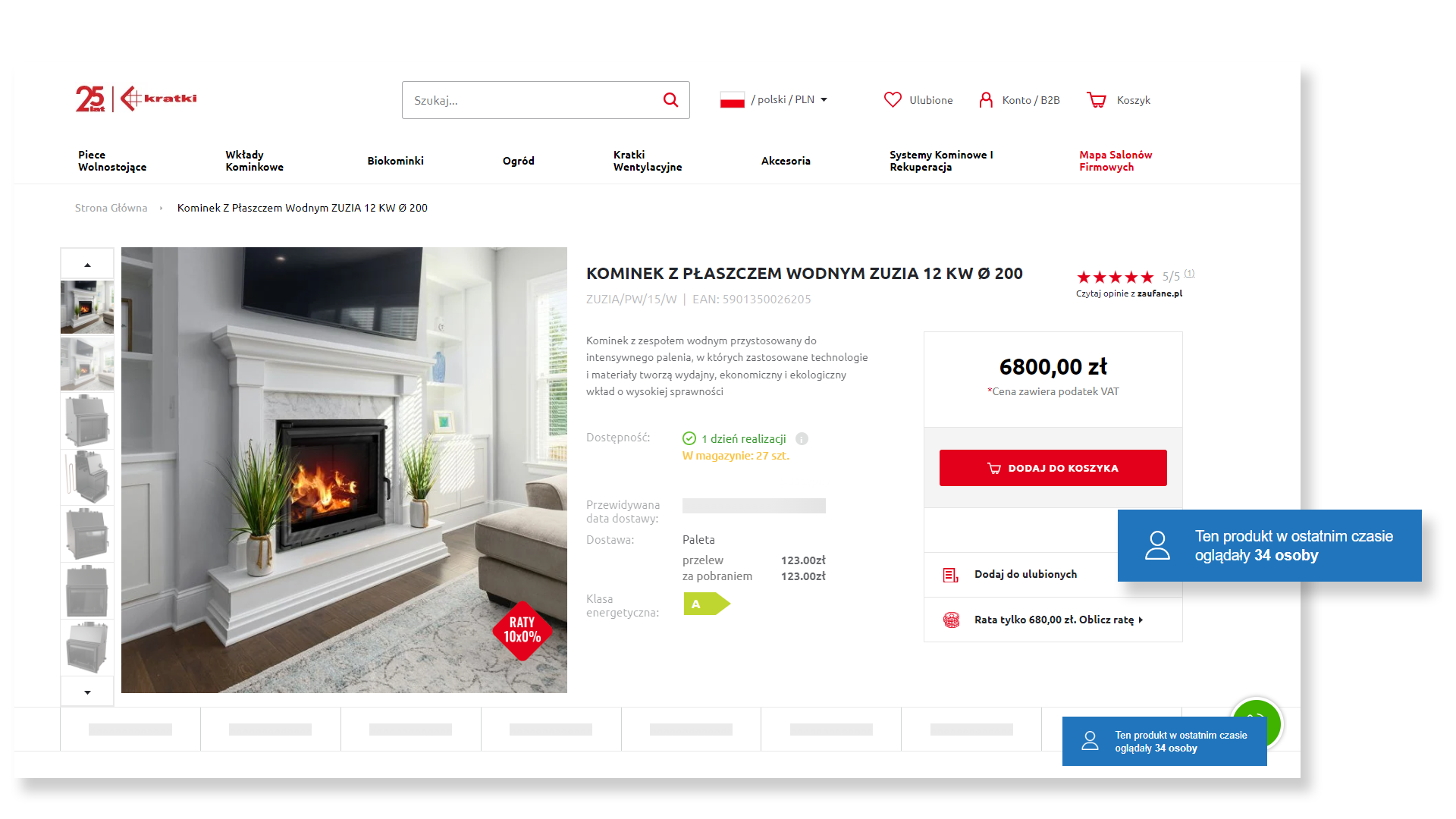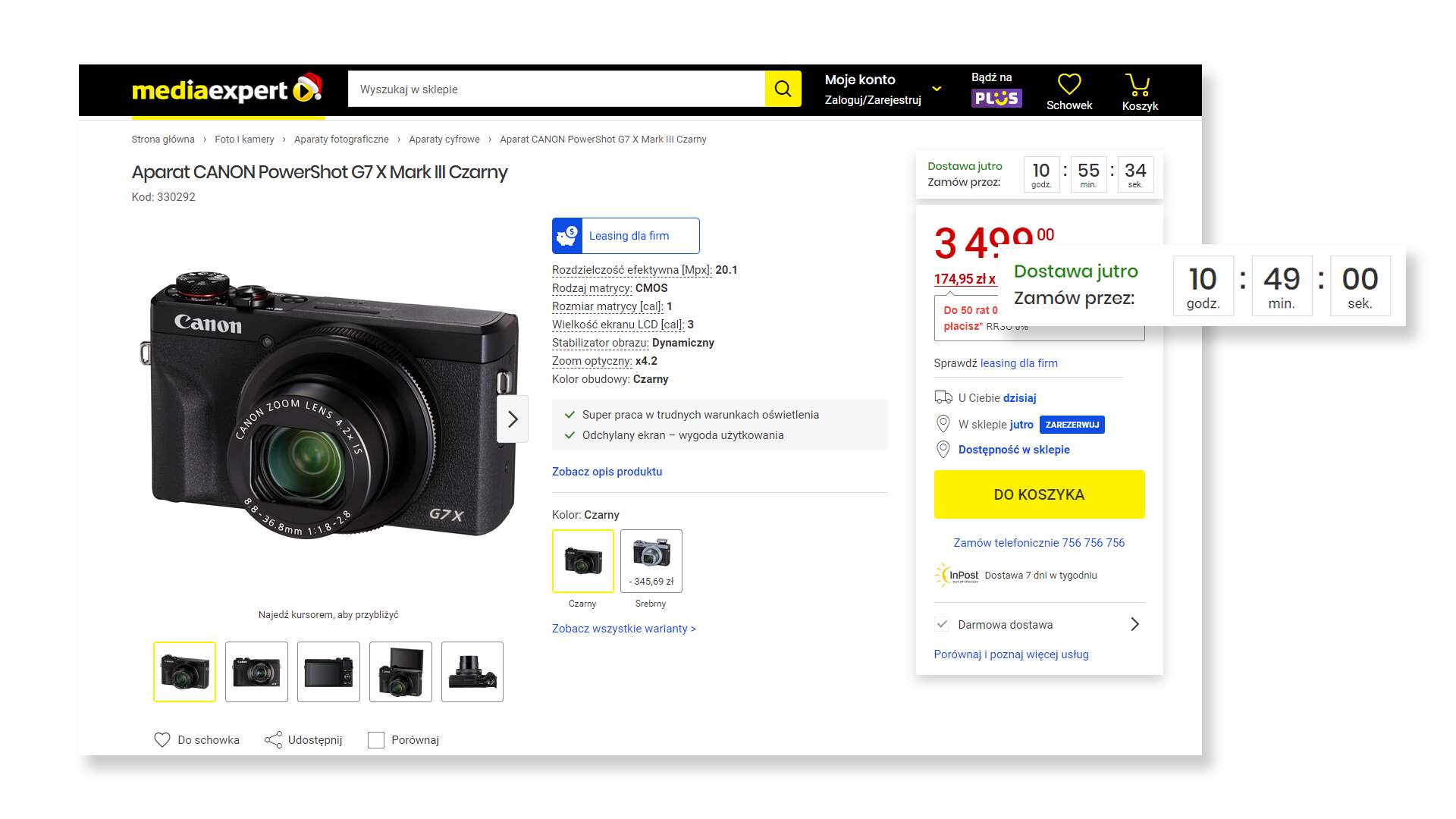Making purchasing decisions is a complex process, influenced by many factors. Customers do not limit themselves to analysing rational aspects such as price or quality. They often also succumb to the influence of emotions. In such a case, can one predict the choice a buyer will make? Although answering this question seems impossible, understanding the various motivations behind this process facilitates knowledge of the most important psychological mechanisms shaping their purchasing decisions. By reading this article, you will learn about the most popular ones. Discover what elements make up the psychology of eCommerce customers and incorporate them into your sales strategy!
Do you think you know your customers well?
What influences the purchasing decisions of e-consumers?
Customers browsing the Internet in search of the best products are exposed to a number of triggers that shape their choices. Due to the abundance of available information, it often happens that they change their decisions multiple times before the final purchase. According to the Gemius report titled "E-commerce 2022 w Polsce" the purchasing decisions of Poles are mainly shaped by factors such as:
- transaction safety - customers want to be sure that their data is protected and transactions are secure.
- convenience - fast delivery, the possibility of personal pickup, and a variety of payment forms, from traditional cards to online payment systems, positively influence the decision to place an order.
- discounts and promotions - buyers willingly take advantage of opportunities to save, and time-limited promotions or special discounts can encourage a purchase.
- personalised offers - users appreciate a personalised approach that makes offers more relevant to their needs.
- high-quality photos and videos - the visual presentation of products plays a key role in making online purchasing decisions. It not only allows a closer look at the offer but also affects the senses and strengthens the desire to own a particular product.
Each of these factors can motivate purchases to varying degrees depending on individual consumer preferences and the specifics of the industry or type of products. In every case, understanding customer motivations will be key to conducting effective sales activities.
What drives eCommerce customers to make purchases?
The wide range of products and services, the growing number of online stores, diverse pricing and marketing strategies make it increasingly difficult to predict the purchasing decisions of users. Nevertheless, it is not an impossible task. In predicting customer behaviour, psychological mechanisms play a key role, accompanying most people while browsing e-store pages. Understanding these mechanisms allows for delivering more personalised and satisfying shopping experiences to customers. Discover what to pay attention to in order to precisely adjust your eCommerce strategy to customer expectations.
The Power of Social Proof
Have you ever wondered why you are more likely to use services recommended by friends, watch movies with positive reviews, or reach for brands that have a large group of trusted customers? All this is thanks to the power of social proof - a psychological mechanism based on observation and imitation of others' behaviours, especially in uncertain situations or those requiring a decision. People usually look for confirmation that their choices are good and accurate or simply acceptable and conform with social norms.
How to use the power of social proof in your eCommerce?
In the context of online purchases, the power of social proof is a key element influencing consumers' decisions. Opinions of other customers, their experiences, and recommendations constitute a solid criterion for many people in choosing products or services (especially when there is no possibility of seeing or testing them “live”). Therefore, placing other users' reviews (whose authenticity is confirmed according to the Omnibus directive) on the product page or in another visible place in the e-store is key to building trust. Similarly effective can be the inclusion of reviews or information about the number of customers who bought a particular product or are viewing its page at that moment. Such a message additionally affects emotions, arousing in the viewer the desire to purchase the article before others do.
 Źródło: kratki.pl
Źródło: kratki.pl
Consciously using the power of social proof in eCommerce not only increases customer trust but also encourages them to make more certain and thoughtful purchasing decisions.
The Principle of Reciprocity
Humans naturally respond to others' kindness by offering similar, good gestures. Colloquially, such behaviours can be defined as "a favour for a favour." However, in psychology, they are known as the principle of reciprocity. What exactly does it entail? The principle of reciprocity is a mechanism that is based on the human tendency to reciprocate for received benefits. This psychological phenomenon means that people feel social pressure to repay the good that has come to them. Therefore, the principle of reciprocity plays an important role in social relationships and also finds practical application in many areas, including marketing and commerce.
How to use the principle of reciprocity in your eCommerce?
In the context of eCommerce, the principle of reciprocity is most often used by offering customers “something” valuable in return for their purchases. Excellent examples include:
- gift cards - online stores often offer gift cards as a bonus for making a purchase or meeting certain conditions. Such an action not only increases the order value but also motivates for repeat transactions. Studies show that people with a 100 PLN gift card usually make purchases for 135 PLN (as reported by Business Insider).
- loyalty programs - programs where customers collect points for purchases (and then exchange them for additional benefits) make customers feel rewarded for their loyalty.
- knowledge - it is worth remembering that the use of the principle of reciprocity does not only have to involve offering material benefits. Many online stores share knowledge with their customers, using, among others, free consultations with a specialist, a newsletter with advice, or help in choosing a product (e.g., placing a size calculator on the product page).
Using the principle of reciprocity not only affects increasing customer trust in the long term but also creates positive shopping experiences that translate into increasing the value of the shopping cart.
Fear of Missing Out (FOMO)
FOMO, or fear of missing out, is the fear of losing unique opportunities, which is increasingly felt by internet users. According to research by the University of Warsaw, such a state can affect up to 94% of representatives of the younger generation. What exactly does FOMO entail?
It is a term describing a psychological state in which a person fears that they are not participating in something interesting or important. Therefore, they may feel excluded or overlooked. The phenomenon of FOMO often occurs among social media users, who show a constant need to monitor the activities of other users. Browsing content on social media enhances the desire to participate in various events and own various items. This desire can lead to making impulsive decisions, often motivated only by the fear of missing out on an opportunity.
How to use FOMO in your eCommerce?
FOMO is often used by online stores as an essential part of their marketing strategy. Understanding and skillfully using this psychological mechanism can effectively stimulate customers' purchasing activity. Brands often create a sense of urgency, using actions such as time-limited promotions, exclusive offers, or information about the limited availability of products. An example of using FOMO in eCommerce could be providing exclusive access to a new collection only for registered users, which not only motivates users to act immediately but also builds a sense of exclusivity. A popular practice is also placing information about the limited availability of an offer on the product page (e.g., “last pieces,” “promotion lasts only 24h”).
 Źródło: mediaexpert.pl
Źródło: mediaexpert.pl
However, it is worth keeping in mind that excessive use of this psychological mechanism can undermine customer trust - including FOMO in the eCommerce strategy should be subtle, ethical, and always focused on delivering value.
The Sense of Community and Belonging
Creating a sense of online community plays a key role in today's society. Online activity permeates various areas of life and significantly affects interactions between people. Virtual space becomes not only a place where its users exchange information but also build lasting relationships with people with common interests and values.
How to build a sense of belonging in your eCommerce?
Building a sense of community in eCommerce is an important step in building long-term relationships with customers. To effectively create an atmosphere of community around your brand, it is worth focusing on authentic and engaging activities. How to achieve such an effect in your eCommerce?
- User Generated Content (UGC) - encouraging customers to share their experiences through self-created content is an effective (and increasingly popular) way to build a community. A client who publishes photos, reviews, or opinions about products or a brand will surely feel part of a larger group.
- Social media - social media platforms are excellent tools for building a brand community. Active participation on platforms such as Instagram, Facebook, or TikTok allows for direct and less formal interaction with customers.
- Sense of exclusivity - offering exclusive access or offers only to customers (e.g., subscribed to a newsletter) will also positively influence building a bond with the brand.
In short, building a sense of community in eCommerce is based on actively engaging customers, creating unique experiences, and allowing them to participate in the process of creating a brand. This not only strengthens bonds but also creates a lasting and positive connection between the brand and its customers.
Why is it worth using psychology in eCommerce?
The principle of reciprocity, FOMO, or the power of social proof are phenomena that interpenetrate each other. Therefore, it is worth using their power of influence in various areas of your online store (e.g., creating a newsletter for regular customers will simultaneously affect the sense of belonging and the occurrence of the principle of reciprocity). In any case, remember, however, that understanding the motivations guiding your eCommerce customers is not just a way to increase sales. It is also a tool that will serve



